ARTICLE AD BOX

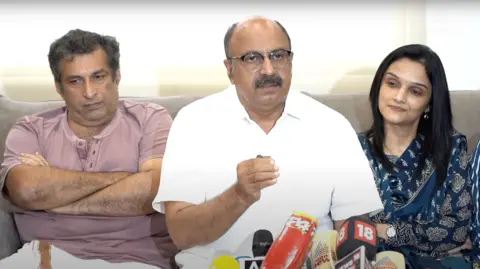 Press Trust of India
Press Trust of India
Actor Siddique (centre) has denied the sexual abuse allegations made against him
Allegations. Resignations. Police complaints.
These words have been dominating headlines and shaking up a bustling film industry in the southern Indian state of Kerala since last week.
The state has been witnessing a flurry of sexual abuse allegations against some top male stars since a landmark report that looked into problems faced by women in the industry was released last week.
The industry, which makes around 150-200 Malayalam-language films a year, is a vital, vibrant business that has made some of the most critically acclaimed and progressive cinema emerging from India.
But the 290-page report by a three-member panel - called the Hema committee - detailed the problems faced by women in Malayalam cinema, including poor working conditions and rampant sexual harassment. Parts of the report have been redacted to hide the identities of the survivors as well as those accused of harassment.
Since its release, a number of women - some of whom have now given up acting - have publicly spoken about facing sexual assault and harassment in the industry.
More than a dozen police complaints have been filed against some male stars, two of whom have also filed counter-complaints.
The shake-up has been so huge that the entire top governing body of the state’s biggest film group - the Association of Malayalam Movie Artists (AMMA) - was dissolved after its president, superstar Mohanlal, resigned on “moral grounds” after some members faced accusations.
“This is just the tip of the iceberg. Only a few have spoken up till now. More serious issues may emerge,’’ actor Mala Parvathy told BBC Hindi.
The reactions to the first-of-its-kind report are being closely watched by people in India’s many film industries, including Bollywood. During the #MeToo movement, several women had made sexual harassment allegations against actors and filmmakers in different states but few of these have been investigated.

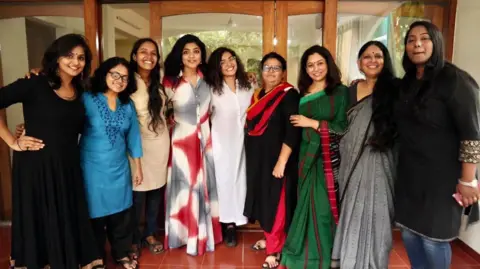 Women in Cinema Collective/Facebook
Women in Cinema Collective/Facebook
The 2017 assault on an actress sparked the formation of the Women in Cinema Collective (WCC), which was instrumental in the report's release
The government set up the Hema committee, headed by a former judge of the Kerala High Court, in 2017 in the aftermath of the shocking sexual assault on a leading actress. One of Kerala’s biggest actors, Dileep, was named by police as an accused and charged with criminal conspiracy. He has denied the charges, but was arrested and held in custody for three months before being released on bail. The case is still being heard in court.
After the release of the report, the first public allegation came from Bengali actress Sreelekha Mitra, who accused well-known director Ranjith of sexually harassing her a few years ago. He has denied this but resigned as chairman of the state’s prestigious motion picture academy. Mitra has filed a police complaint.
Many of the other complaints echo some of the revelations made by unnamed women in the Hema committee report that they were repeatedly asked to “compromise” and “adjust” in exchange for opportunities.
Minu Muneer told BBC Hindi as well as several other news channels that an actor had hugged and kissed her without her consent while they were shooting a film. She has also detailed instances of sexual misconduct by others in the industry, including prominent actor and lawmaker Mukesh.
Mukesh has denied the allegations against him and accused Muneer of trying to blackmail him.
“I welcome any investigation into allegations made against me and others in the film industry,” he wrote in a Facebook post.

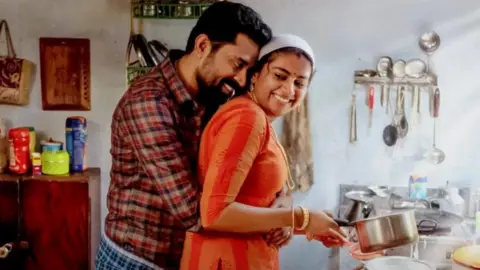 Jeo Baby
Jeo Baby
The Malayalam industry has produced critically acclaimed films such as The Great Indian Kitchen
Two actresses have accused a director of knocking on the doors of their hotel rooms in the middle of the night. He has not responded to the allegation.
One actress has accused well-known actor Siddique of raping her in 2016 and filed a police complaint against him. Siddique, who resigned as AMMA general secretary after the accusation, has denied this and accused the complainant of trying to “tarnish his reputation”.
While the Kerala government had been praised for being the first to set up such a committee, the report's release has also put it on the back foot.
The report, which was submitted in 2019, was released only last week after nearly five years of delay and multiple legal challenges by members of the film industry. The government then said that while it would investigate all complaints filed before the police, it would not take up any cases on its own. But as pressure mounted, it has set up a special team to investigate complaints.
The Kerala High Court has also asked the government to submit the entire report - including the 54 redacted pages - to it.

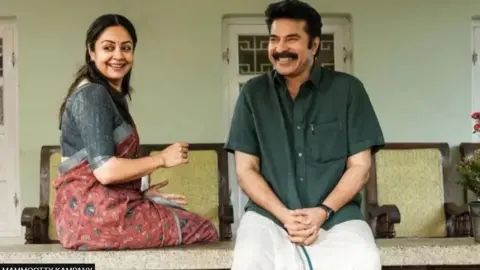
Superstars like Mammootty (right) have been criticised for not commenting publicly on the controversy
Within the Malayalam film industry, reactions to the report have been mixed. Superstars such as Mohanlal and Mammotty have been criticised for not making a public comment yet.
Some actors have welcomed the release of the report and called for the government to launch a proper investigation into the allegations. A prominent film employees’ federation has asked the government to disclose the names of those accused in the report.
Others have lamented that the report is being used to brand all men in the industry as abusers.
But many have also argued that the report and the subsequent shake-up are positive, much-needed changes in an industry often celebrated for making progressive films.
“I am not ok with people saying, ‘Malayalam industry is so rotten inside’. No, we are good inside, which is why we are fixing it,” actress Parvathy Thiruvothu, a founding member of the Women in Cinema Collective, an organisation formed in the aftermath of the 2017 assault, told a news channel.
It was the industries "you don’t hear anything about" that people should be "worried about”, she added.
Additional reporting by Meryl Sebastian in Delhi

 2 months ago
14
2 months ago
14
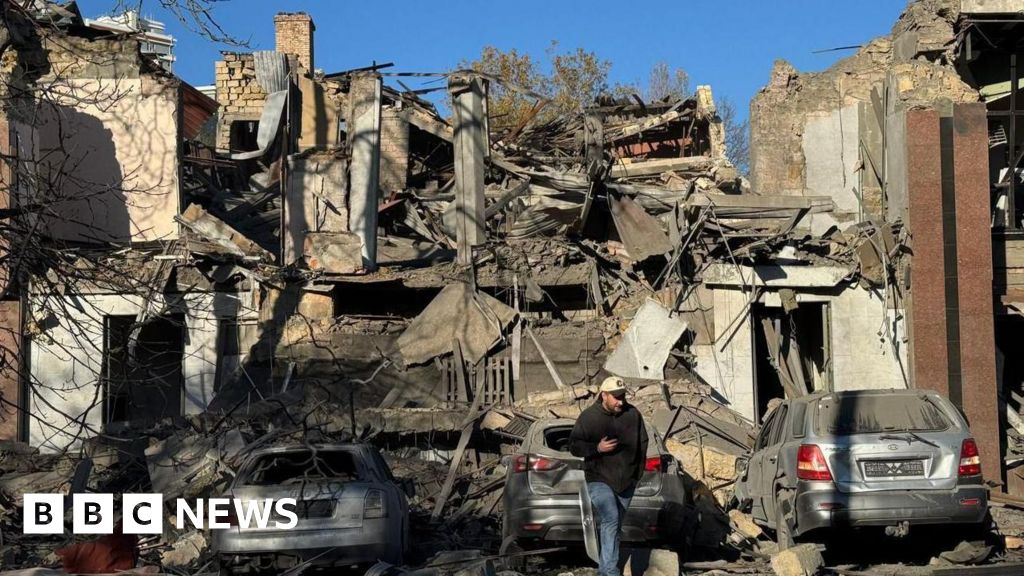

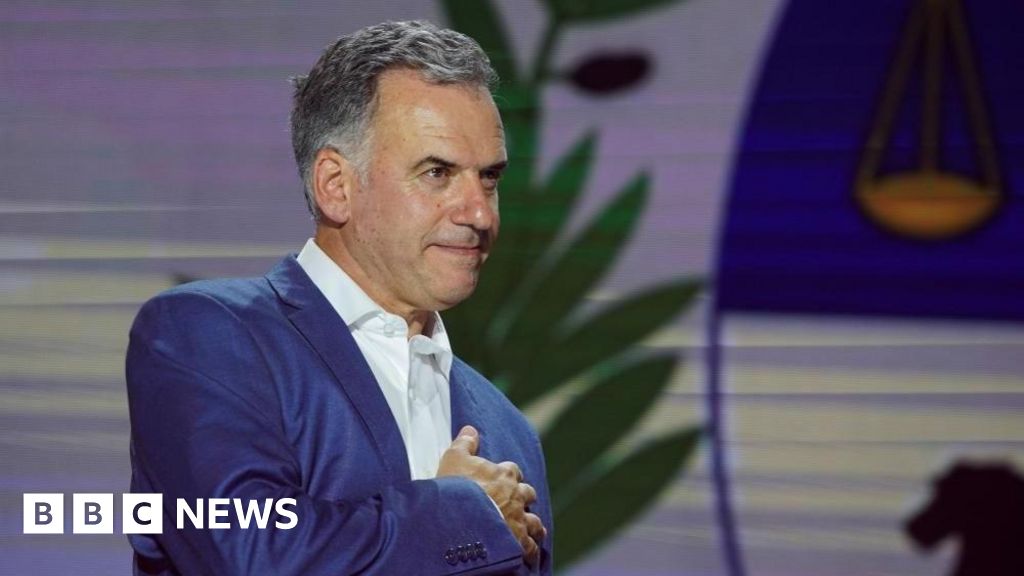





 English (US)
English (US)